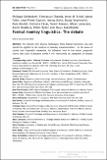Formal monkey linguistics : the debate
Abstract
We explain why general techniques from formal linguistics can and should be applied to the analysis of monkey communication - in the areas of syntax and especially semantics. An informed look at our recent proposals shows that such techniques needn't rely excessively on categories of human language: syntax and semantics provide versatile formal tools that go beyond the specificities of human linguistics. We argue that "formal monkey linguistics" can yield new insights into monkey morphology, syntax, and semantics, as well as raise provocative new questions about the existence of a pragmatic, competition-based component in these communication systems. Finally, we argue that evolutionary questions, which are highly speculative in human language, can be addressed in an empirically satisfying fashion in primate linguistics, and we lay out problems that should be addressed at the interface between evolutionary primate linguistics and formal analyses of language evolution.
Citation
Schlenker , P , Chemla , E , Schel , A M , Fuller , J , Gautier , J P , Kuhn , J , Veselinović , D , Arnold , K , Cäsar , C , Keenan , S , Lemasson , A , Ouattara , K , Ryder , R & Zuberbühler , K 2016 , ' Formal monkey linguistics : the debate ' , Theoretical Linguistics , vol. 42 , no. 1-2 , pp. 173-201 . https://doi.org/10.1515/tl-2016-0010
Publication
Theoretical Linguistics
Status
Peer reviewed
ISSN
0301-4428Type
Journal article
Collections
Items in the St Andrews Research Repository are protected by copyright, with all rights reserved, unless otherwise indicated.
Related items
Showing items related by title, author, creator and subject.
-
Formal monkey linguistics
Schlenker, Philippe; Chemla, Emmanuel; Schel, Anne M.; Fuller, James; Gautier, Jean-Pierre; Kuhn, Jeremy; Veselinović, Dunja; Arnold, Kate; Cäsar, Cristiane; Keenan, Sumir; Lemasson, Alban; Ouattara, Karim; Ryder, Robin; Zuberbühler, Klaus (2016-07-05) - Journal articleWe argue that rich data gathered in experimental primatology in the last 40 years can benefit from analytical methods used in contemporary linguistics. Focusing on the syntactic and especially semantic side, we suggest ... -
Spatial agency bias and word order flexibility : a comparison of 14 European languages
Suitner, Caterina; Maass, Anne; Navarrete, Eduardo; Formanowicz, Magdalena; Bratanova, Boyka; Cervone, Carmen; Hakoköngäs, Juho Eemeli; Kuppens, Toon; Lipourli, Eleni; Rakić, Tamara; Scatolon, Andrea; Teixeira, Catia P.; Wang, Zhenlan; Sobral, Maria Pedro; Carrier, Antonin (2021-05-01) - Journal articleThe spatial agency bias predicts that people whose native language is rightward written will predominantly envisage action along the same direction. Two mechanisms contribute jointly to this asymmetry: (a) an embodied ... -
Animal linguistics in the making : the Urgency Principle and titi monkeys’ alarm system
Narbona Sabaté, Lara; Mesbahi, Geoffrey; Dezecache, Guillaume; Cäsar, Cristiane; Zuberbühler, Klaus; Berthet, Mélissa (2022-04-01) - Journal articleThe emergent field of animal linguistics applies linguistics tools to animal data in order to investigate potential linguistic-like properties of their communication. One of these tools is the "Urgency Principle", a pragmatic ...

